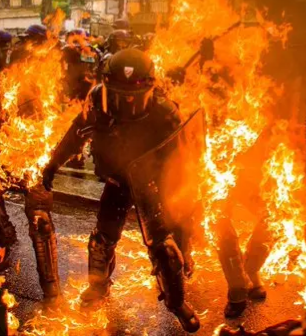

Using Prolewiki as the source.
In a bourgeois democracy, the role and nature of the police are complex and often controversial. Based on the principles outlined in ProleWiki, we can analyze the police in bourgeois democracies as follows:
Function within the Capitalist System
The police in a bourgeois democracy primarily serve to maintain the existing social and economic order, which benefits the bourgeoisie (ruling class) at the expense of the proletariat (working class)[1][2]. Their main functions include:
- Protecting private property and enforcing property laws
- Suppressing working-class movements and strikes
- Maintaining public order in a way that preserves bourgeois interests
Relationship to State Power
In bourgeois democracies, the police are an integral part of the state apparatus, which Marx and Lenin described as an instrument of class rule[2]. The police, along with other state institutions, help to enforce the “dictatorship of the bourgeoisie” - the political dominance of the capitalist class.
Role in Social Control
The police play a crucial role in social control within bourgeois democracies:
- Enforcing class divisions: They often disproportionately target working-class and marginalized communities.
- Suppressing dissent: Police are frequently used to break up protests and demonstrations that challenge the status quo.
- Maintaining ideological control: Through their actions and public presence, police reinforce the legitimacy of the bourgeois state.
Contradictions and Limitations
While the police in bourgeois democracies claim to serve and protect all citizens, their actions often reveal the class nature of their role:
- Selective enforcement: Laws are often applied more strictly to working-class and marginalized communities.
- Protection of capital: During labor disputes, police typically side with employers rather than workers.
- Militarization: Many police forces in bourgeois democracies have become increasingly militarized, reflecting the state’s preparation for potential class conflict[4].
It’s important to note that individual police officers may not be consciously aware of their role in maintaining class society. Many join the force with genuine intentions to help their communities. However, the institutional structure and function of the police in bourgeois democracies ultimately serve to uphold capitalist relations of production and bourgeois political dominance[1][2].
Sources [1] Fascism - ProleWiki https://en.prolewiki.org/wiki/Fascism [2] Bourgeois democracy - ProleWiki https://en.prolewiki.org/wiki/Bourgeois_democracy [3] Bourgeoisie - ProleWiki https://en.prolewiki.org/wiki/Bourgeoisie [4] Democratic People’s Republic of Korea - ProleWiki https://en.prolewiki.org/wiki/Democratic_People’s_Republic_of_Korea [5] ProleWiki:Principles https://en.prolewiki.org/wiki/ProleWiki:Principles










Low Energy